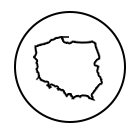Florian, Maria, Stanisław, Helena Węgłowscy and neighbor
 Place
PlaceLudwipol
 People
PeopleWęgłowski Florian
Węgłowska Maria
During the German occupation Nowa Huta was Ludwipol municipality (province of Volhynia, now Ukraine). Among the approximately 130 homes have also been building which belonged to Florian and Maria Węgłowskich. It’s there, where after escaping from the ghetto got Wexler family.
Poles and Jews from the territory of the Nowa Huta lived in harmony.
„To the Jew by the name Wexler my father gave a piece of land to built a mill. In exchange they made a deal that until my dad will live he wouldn’t have to pay for grain milling.” Between Węgłowski and Wexler raised a friendship that has withstood the test of war.
Węgłowscy were quite wealthy and they had noble roots. In September of 1939 they were threatened with sent to Siberia. If not for the help of Wexler family, their fate would be decided. Wexler invited local chief for dinner. At the richly laid table he managed to convince the governor of villages to let Węgłowscy family to remain on their lands. „I know only that he agreed that we were not kulaks but middlers. The middle class was transported in the future. After 1.5 years to our territory entered Germans. If not for that, we would eventually landed in Siberia.”
By order of the German occupiers, the Jews were relocated to a nearby Ludwipol village. There was created a ghetto. „Węgłowscy were left with two cows. Reigned poverty. However, they still shared what they could”. They never refused help for Jews who were assigned to work with wood chopping. Tired men often came to Węgłowskichs to eat and sleep. „We kept about 20 people. But we almost had nothing. For lunch we ate smashed potatoes with poppy seeds. My mom added to it a little sweet milk. And nevertheless we still shared”.
In 1943 the Nazis began to liquidate the ghetto in Ludwipol. Jankiel Wexler tried to buy freedom for his family. He was shot for trying to negotiate about it. Chana Wexler – his wife did not give up. She waited for late night hours, and appealed to the German policeman with the request output. The policeman helped Chana, her daughter Mira and her in-laws. „The German led the family across the river, in the woods near the graves, ordered them to flee, and he gave 3 shots in the air.” Under cover of the night, the fugitives rushed to their pre-war friends. Węgłowski assured for Chana and her daughters a shelter at his neighbor. They lived there in winter and spend the summer at Węgłowskich’s the field – they kept them supplied with food. „There was a hill, surrounded by trees, bushes and a field. They were sitting in this hole, on the straw. During the day, they were invisible.” Chana’s son-in-law went to a neighboring village, where he was waited by his family. The family was taken away from ghetto by Stanisław Węgłowski.
After the liberation in 1945 Chana and her family moved to Brazil. Contact with Węgłowskichs family has stopped. Only because Chana’s daughter in-law, who run the store in Wrocław, a longstanding friendship became alive again. Chana get to know that after the war Węgłowscy lived in the village Dół. The woman sent them coffee. The product was then uncommon.
Almost 70 years after the war, the Jewish Fund for justice organized the meeting of Helena Szachniewicz (from house Węgłowska) with her old friend – Mira and her family. Stanisław Węgłowski, Helena’s brother, was also invited, but due to health was unable to attend the meeting.
For their actions, Florian, Maria, Stanisław and Helena Węgłowscy were awarded by the Institute Yad Vashem with title of Righteous among the Nations of the World.
Bibliography:
- FLV, O. Krotowska, Polały się łzy, „Kurier Iławski” 2014, nr 1.
DOCUMENTS:
No extra materials